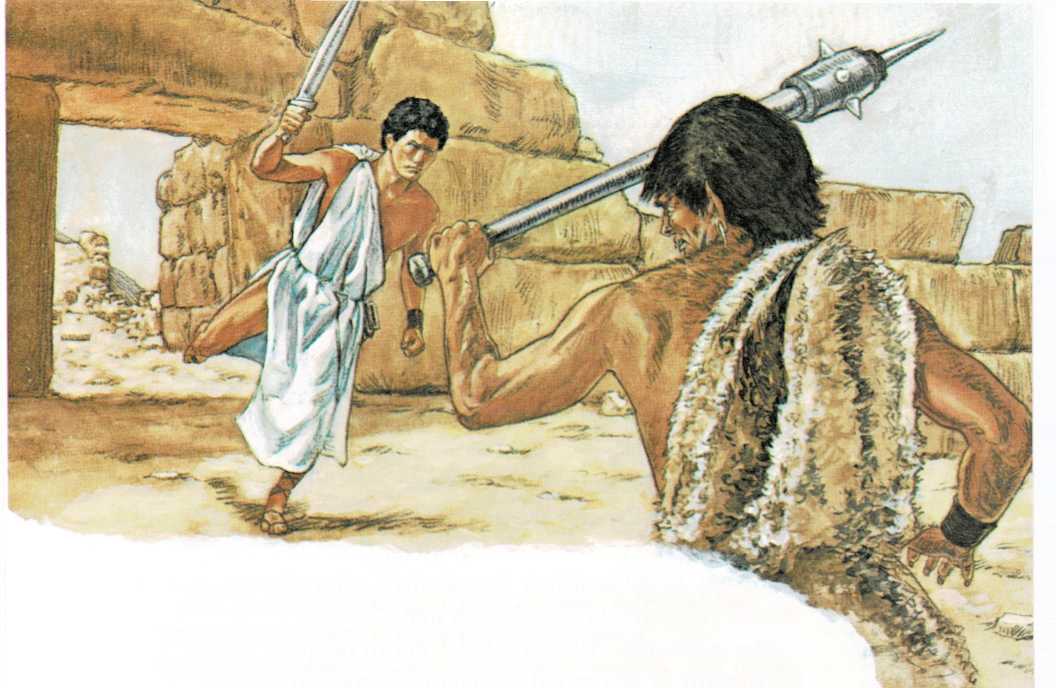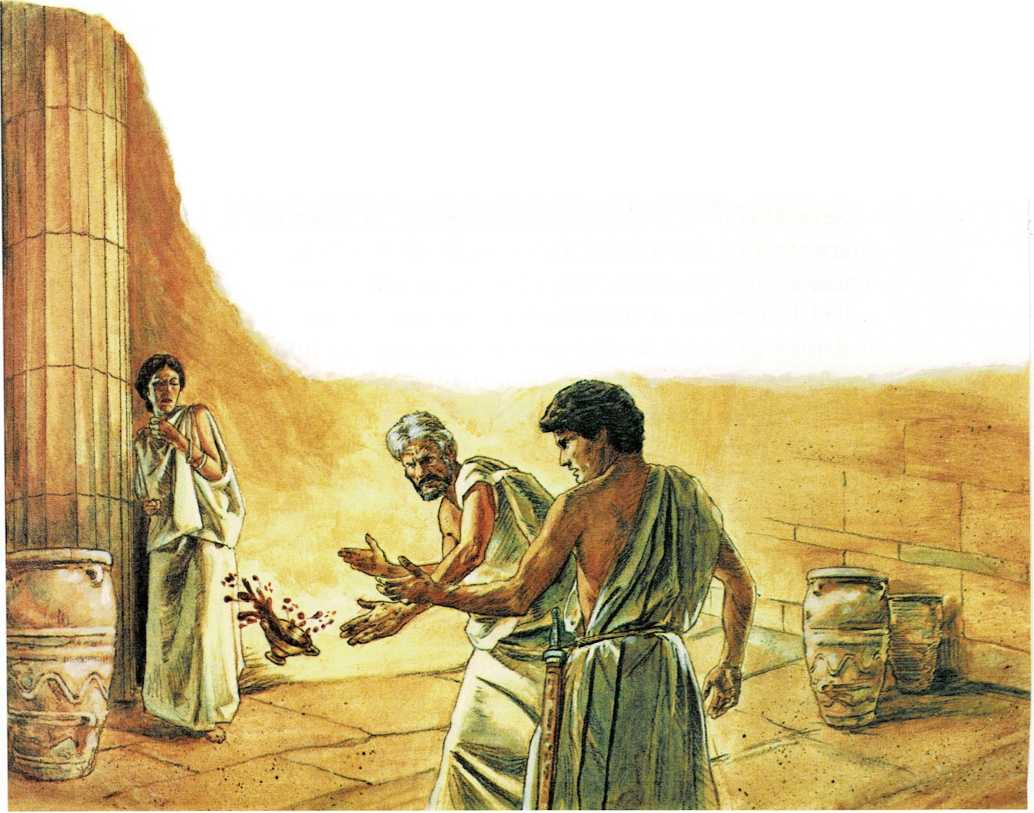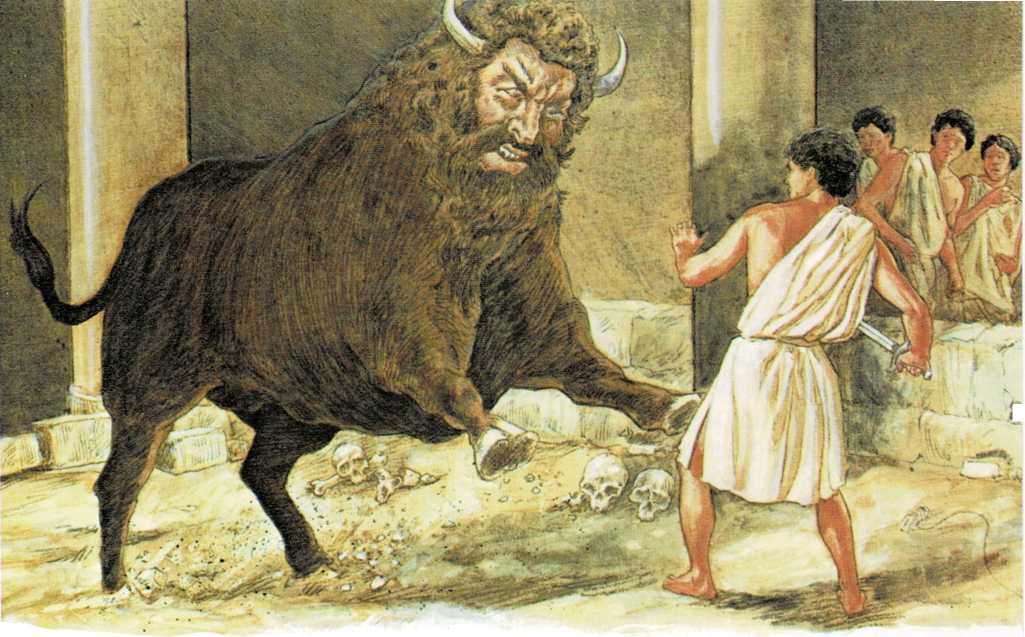Myths of Ancient Greece
from Stories of the Gods and. Heroes by Sally Benson
Myths are the wonderful tales that people long ago told about their gods
and heroes—tales that still fascinate people today. Here are two Greek
myths that are more than two thousand years old. The first myth tells
about one of the adventures of Theseus, a hero who performed many great
deeds. The other is the story of a man who was neither a god nor a hero,
but who struggled to fly.
Theseus and the Minotaur
Theseus was the son of Aegeus, king of Athens, and of
Aethra, daughter of the king of Troezen. He was brought up at Troezen,
and when he reached the age of manhood was to proceed to Athens and
present himself to his father. Before his son’s birth, Aegeus had placed
his own sword and shoes under a large stone and told his wife to send
his son to him when he became strong enough to roll away the stone and
take the sword and shoes from under it. When she thought that the time
had come, his mother led Theseus to the stone, and he rolled it aside
with ease.
As the roads were infested with robbers, his grandfather, the king of
Troezen, urged him earnestly to take the shorter and safer way to his
father’s country, which was to go by sea. But the youth, feeling in
himself the spirit and soul of a hero, was eager to emulate
Hercules,[^5] with whose fame all Greece then rang. He wished to destroy
the evildoers and monsters that oppressed the country, and determined to
take the more perilous and adventurous journey by land.

His first day’s journey brought him to Epidaurus where Periphetes
dwelt, the son of Vulcan.^2^ This ferocious savage always went about
armed with a clubof iron, and all travelers stood in terror of his violence.
When he saw Theseus approach, he set upon him
viciously, but he soon fell beneath the blows of the young hero, who
took possession of his club and carried it ever afterwards as a memento
of his first victory.
Several similar contests with the petty tyrants and marauders of the
country followed, in all of which Theseus was victorious. One of these
monsters was called Procrustes or the Stretcher. He had an iron bedstead
on which he tied all travelers who fell into his hands. If they were
shorter than the bed, he stretched their limbs to make them fit it; if
they were longer than the bed, he cut off their feet. Theseus tied him
to the bed and cut off his head to make him fit it.
Having overcome all the perils of the road, Theseus reached Athens at
last, where new dangers awaited him. Medea,[^6] [^7] the sorceress who
had fled from Corinth
after her separation from Jason,^4^ had become the wife of Aegeus, the
father of Theseus. Knowing by her magic arts who Theseus was, and
fearing the loss of her influence with her husband if Theseus should be
acknowledged as his son, she filled the mind of Aegeus with suspicions
of the young stranger. She whispered to Aegeus that the youth had come
to poison him, and that he, in turn, should administer a cup of poison
to Theseus. But when Theseus stepped forward to take the cup, Aegeus
caught sight of his own sword hanging at the hero’s side. Striking the
fatal cup to the floor, he embraced the boy and called upon everyone to
witness that he had found his son. Medea, once more detected in her
villainies, fled the country and went to Asia, where the country
afterwards called Medea received its name from her.
The Athenians were at that time in deep affliction on account of the
tribute which they were forced to pay to Minos, king of Crete. Every
year seven youths and seven maidens were sent to be devoured by the
Minotaur, a monster with a bull’s body and a human

4. Jason was a Greek hero who led a band of men called the Argonauts
on the dangerous quest for the Golden Fleece.
head/’ It was a horrid beast, strong and fierce, and was kept in a
labyrinth which had been constructed by Daedalus, a skilled craftsman.
The labyrinth was so artfully designed that whoever entered it could
never find his way out unassisted. Paths led into paths, and all of them
seemingly led nowhere. Here the Minotaur roamed and was fed with human
victims.
Every year when the time came for the youths and maidens to be delivered
to the monster, the country was plunged into mourning. Mothers trembled
lest their beautiful daughters or brave sons should be chosen to feed
the dreadful creature, and the houses of the entire populace were draped
in black as the procession of young people bravely set out for the
labyrinth.
When Theseus arrived in Athens, the time was approaching for the
sacrifice. He noticed the sad faces of the people of the city and asked
his father to tell him the cause of their sorrow. Aegeus reluctantly
told him the story. Theseus, indignant at the cruel and useless
sacrifice, resolved to deliver his countrymen from the calamity or die
in the attempt. The youths and maidens were drawn by lot every year, but
Theseus, in spite of the entreaties of his father, offered himself as
one of the victims.
The morning for their departure dawned, and Theseus joined the weeping,
shivering group. They were dressed in deep black, but Theseus had
arrayed himself in gay colors, confident of victory. The ship which was
to carry them to their destination had black sails, and Theseus promised
his father that he would change the sails to white if he returned
victorious.
When they arrived in Crete, the youths and maidens were exhibited before
Minos, and Ariadne, the daughter of the king, saw Theseus and fell in
love with
5. In other tales, the Minotaur is described as having the head of a
bull and the body of a man.
him. She furnished him with a sword and with a spool of thread. She
instructed him to fasten the thread to a stone as he entered the
labyrinth and unwind it as he made his way into the maze, keeping it
firmly grasped in his hand so that he could guide himself back to the
daylight once more.
Cheered by these gifts, the young people entered the dark, wet caves.
They clung together while Theseus fastened the thread securely to a
jutting rock, and then, walking one behind the other, they followed the
first path. Around and around they traveled, their ears alert for the
slightest sound which would warn them of the approach of the monster. It
was pitch dark, and Theseus was careful of the thread lest it catch on a
sharp corner and break off. They wandered for hours, too cold and
frightened to sit down. Their eyes became accustomed to the darkness and
they could make out the tall grey walls and hundreds of paths winding in
the half-light. There was an odor of decay in the air, and they saw the
white bones of the victims of other years lying on the ground.
Suddenly, they heard a tremendous bellowing and the stamping of angry
feet. It was the Minotaur, ravenous from his year’s fast, and anxious to
partake of the sweet blood of the youths and maidens. At the sound,
there were screams of horror from the victims. Theseus begged them to be
calm and, ordering them to a place of comparative safety in the rocks,
he advanced alone to meet the Minotaur. He saw the monster’s head as it
turned the corner. Its beard was caked with the blood of years. Its
mouth dripped in anticipation of the feast that awaited it. It uttered
wild cries which resembled the bellowings of a bull and the roars of an
insane human. As it caught sight of Theseus, it galloped forward ready
to crunch him in its powerful jaws, trample him with its cloven hoofs,
and devour him.

With one quick movement, Theseus stepped forward and plunged his sword
into the creature’s breast. Maddened, the Minotaur reared and would have
brought its feet down on Theseus’s head, had not the hero ducked and
stabbed him time and time again. When the monster lay dead, the young
people threw their arms around one another in a frenzy of joy. Following
the precious thread, they made their way out of the labyrinth.
They silently crept to their ship which lay in the harbor, and, with
Ariadne, set sail for Athens. On their way home, they stopped at the
island of Naxos where Theseus dreamed that Minerva appeared to him and
commanded him to abandon Ariadne. He awoke and roused his companions,
leaving Ariadne asleep on the island.
On approaching the coast of Attica, Theseus forgot the signal and
neglected to raise the white sails. Aegeus, thinking his son had
perished, put an end to his own life. Thus, Theseus became king of
Athens.

